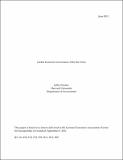Global Economic Governance After the Crisis
Author
Published Version
https://doi.org/10.1111/j.1468-2516.2012.00391.xMetadata
Show full item recordCitation
Frieden, Jeffry. 2012. Global economic governance after the crisis. Perspektiven der Wirtschaftspolitik 13(suppl. s1): 1–12.Abstract
It has become common to insist that contemporary international economic problems require a great increase in the extent of “global governance” of economic affairs. This desire, understandable as it may be, confronts a series of major obstacles. First, the normative case for global governance is more difficult to justify, and more complex, than is usually recognized, and requires consideration of both economic and political-economy principles. Second, in practice, the provision of governance at the supra-national level – that is, of international public goods – depends largely on support from powerful and concentrated interests. Third, this dynamic means that the types of international public goods provided, the way they are provided, and the governance structures erected around them are biased in favor of their strongest supporters, and are therefore likely to be a source of continuing controversy.Terms of Use
This article is made available under the terms and conditions applicable to Open Access Policy Articles, as set forth at http://nrs.harvard.edu/urn-3:HUL.InstRepos:dash.current.terms-of-use#OAPCitable link to this page
http://nrs.harvard.edu/urn-3:HUL.InstRepos:10886847
Collections
- FAS Scholarly Articles [18292]
Contact administrator regarding this item (to report mistakes or request changes)



